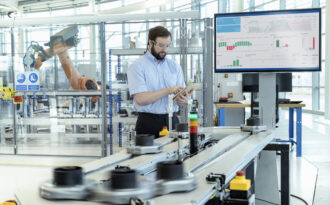

8 min lesen
September 11, 2023
New technologies have the potential to revolutionise healthcare and medical management. Advancements in healthcare technology and the application of artificial intelligence (AI) could enable more convenient and personalised treatment for patients. AI is already being integrated into various medical applications, significantly impacting every stage of a patient’s healthcare journey—from early detection to rehabilitation and post-treatment care.
Below, we explore the key phases of the patient experience and how AI is expected to reshape them:
Wearables and health apps are collecting vast amounts of personal data, which AI could leverage to provide tailored health recommendations in the future. For example, AI could monitor the blood sugar levels of diabetic patients and provide real-time, customised health advice, helping individuals maintain better control over their condition.
Devices such as smartwatches, biosensors, and fitness trackers can monitor heart rate and breathing patterns, alerting users to anomalies before they become critical. AI-powered accelerometer wristbands and bright belts can detect early signs of reduced grip strength, hydration levels, and muscle mass, enabling proactive interventions.
AI-powered smart devices have the potential to assist healthcare professionals in multiple ways. Voice technology could help transcribe clinical data, allowing medical staff to focus more on patient care than administrative tasks. Virtual assistants are expected to experience rapid growth, with the healthcare virtual assistant market projected to reach $2.8 billion by 2027, growing at an annual rate of 27%.
Traditionally, medical test results are manually analysed, a time-consuming process prone to human error. AI can automate this process by recognising patterns in test results, significantly improving the speed and accuracy of diagnostics – especially for infection detection and laboratory testing.
Research suggests that robotic-assisted surgeries can improve patient outcomes. A study found that the success rate for AI-assisted kidney surgeries was 52% higher than for conventional procedures. Additionally, AI-powered robots can assist healthcare staff with routine tasks such as restocking supplies, cleaning patient rooms, and transporting medical equipment, allowing medical professionals to dedicate more time to patient care.
AI-driven personalised healthcare applications are becoming a game-changer in rehabilitation and long-term care management. AI can tailor rehabilitation plans based on patient progress at the individual level, adjusting treatment strategies in real time according to patient feedback. On a larger scale, user-generated data from AI-driven applications can reduce research and development costs while improving the accuracy of clinical trials.
AI-powered virtual nursing assistants can help patients take greater control of their health by enabling them to monitor their progress regularly. This enhances patient empowerment as they gain better insight into their treatment journey and can actively participate in managing their recovery.
AI rapidly transforms the healthcare landscape, improving efficiency, enhancing patient outcomes, and reducing operational costs. As AI technology continues to evolve, its role in healthcare will become even more essential in shaping the future of medicine.

October 8, 2025
The biomethane sector is entering a decisive phase. Driven by climate targets, stricter regulations, and rising demand for renewable energy, the market is experiencing rapid growth. Yet, this expansion also creates new op...

February 3, 2025
The future of ERP lies in more efficient and flexible business solutions. In this article, you will discover how .NET-based ERP systems help you optimize processes while remaining adaptable. Explore the key benefits and technological advancemen...